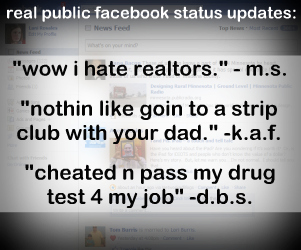Facebook has 99 problems…
 …and being private ain’t one. Facebook continues to make headlines due to security holes that let friends view your private chats to your privacy settings continually being reset to default to public meaning anyone can see anything you do ranging from status updates to your phone number and email to who your friends are.
…and being private ain’t one. Facebook continues to make headlines due to security holes that let friends view your private chats to your privacy settings continually being reset to default to public meaning anyone can see anything you do ranging from status updates to your phone number and email to who your friends are.
The reason this all grabs headlines is Facebook’s cavalier attitude towards data claiming that it wants to be set free and an attitude that privacy inevitably will die given current internet and social networking trends, so why not stick a fork in it and give it to the highest bidder (or in Facebook’s case, any bidder at all, money or no money)?
Facebook is under fire not only for resetting privacy settings on all accounts but for making it difficult to understand with numerous iterations of settings users must discover by clicking around (it isn’t all on one page like you’d think).
Would you want to know if your status updates are public?
I asked on Twitter, “if I learned your facebook status updates were public for everyone to see, would you want me to tell you?” This question got a resounding “yes,” and I had over 20 people immediately ask me via direct message how they could tell.
Without going into privacy settings or freaking out over how do click on X number of links to get to specific settings, a new free service has launched called “Open Book” which searches and reveals all public status updates (meaning a user has permitted their status updates to be seen by anyone).
A quick peek shows some embarrassing information which is the point of their whole project- they agree that Facebook privacy settings are not easily understood by the common user, namely minors (which is a massive majority of those being aggregated on Open Book). OpenBook was developed to show the flaw of Facebook and acts as a statement against Facebook’s attitude toward privacy.
The way I quickly answered those 20 people was to look at their latest Facebook update, for example, “Bella turned 7 today and everyone at Casis Elementary was so wonderful to bring gluten free cupcakes” and went to Open Book, did a search for “Bella, Cassis Elementary” to see if it showed up or not. If it showed up, the status update is public for anyone to see but if it didn’t, the user had effectively made their status updates private.
Why does this privacy matter?
Why does this privacy matter? To some it doesn’t, but to the fake mom above who only has 25 Facebook friends and talks about intimate details of her children by name, allergies and school, this can be frightening.
And as an agent, if you’re speaking openly to your small group of real Facebook friends about how you just got 1% bonus on a listing on the north side, you don’t want the DOJ up in your business insinuating you’re price fixing by talking dollars. As a broker, you don’t want your private rant about the dumb new agent to show up to the world when you only meant it to your family and friends since you don’t associate with industry professionals on Facebook.
What do you think about all of this? Do you know if you have private status updates or not? Let us know if OpenBook surprised you as it did so many of my Twitter friends who thought they were private.
UPDATE: to see if all of your Facebook settings are private, visit ReclaimPrivacy.org which will scan your settings and show you immediately if you’re “secure” or “insecure” with several settings.
To make status updates (and other things) private in Facebook, go to account > privacy settings > personal info > set all to “friends only” to be fully private.
Lani is the COO and News Director at The American Genius, has co-authored a book, co-founded BASHH, Austin Digital Jobs, Remote Digital Jobs, and is a seasoned business writer and editorialist with a penchant for the irreverent.










































Ken Brand
May 17, 2010 at 2:29 pm
Awesome share.
So here’s my thought(s):
1. Reality to Realtor – listen up. Facebook is not private. Google is not private. Everything on the internet, except your Bajillion-Big Bank Encryption is not private. Event data with the banks gets scammed and skimmed. Bottom line – there is not privacy. You post it, it might, can, probably, will and can be found.
2. If there is not privacy and you know it. Act according. In fact, if what you say and share is public broadcast, ummmm, use like a public broadcast. Don’t fight the borg, point the borg. That means be strategic, think before you DO/POST/COMMENT/SHARE anything. If you know everyone can see it, the share what you want people to see, hear, watch and feel. I don’t even trust Facebook mail, too many moving parts, who knows where it can end up.
3. Maybe the government will crack down on these clowns, maybe it’s the new reality. Whatever? In the mean time, be smart, like Sara Bonert ( @SBonert ) shared with me, “Don’t be a TOOL! Use the Tools”.
Great share Lani.
PS. Interesting stuff when I entered “The Woodlands” Again, another tool to push past the slow and clueless. Of course I was clueless about this site till just now;-)
Michael Sosnowski
May 17, 2010 at 2:47 pm
Ken is absolutely correct – there is no privacy and online companies in business for one thing only – to collect data about you and eventually use it for a profit.
Lani Rosales
May 17, 2010 at 3:35 pm
With due respect to both of you guys, I have to disagree. Facebook was originally built as a closed network for college students at Harvard which required an official Harvard student email address in order to create a profile. Then, it opened to college students, allowing anyone with a legitimate .edu email address to log in. Both of these things implied a closed network which implies privacy.
Then, Facebook went global, but even at that stage, there were restrictions for connections that only allowed you to see profile information about people within your region and professional network. Still, this implies a closed network, hence private.
Fast forward to today where Facebook is open to anyone and everyone with an email address and privacy settings have been updated so many times and defaulted to public that the original users NOR the average non tech savvy user should be expected to understand.
Those of us on the tech savvy end of the Facebook users know to check, but studies show that despite Facebook putting a little “we changed settings reminder,” the majority of users are conditioned to “x” out of the update rather than read (think pop up, people don’t read them, they click through to minimize or exit).
All that said, with Facebook specifically, there is a reasonable expectation of privacy with personal data, given its history. I’ve been on Facebook since I signed up in college, do you really think it’s fair to ask someone unlike like me that doesn’t have a tech background that has simply been using FB for years to understand the evolving world? No.
Ken Brand
May 17, 2010 at 5:52 pm
Good points Lani. I’m not saying that people shouldn’t have a reasonable expectation of privacy and no doubt the original intent of Facebook is 180 degrees from where they are today. I am saying that Facebook is NOW a business. The goal is to monetize what’s shared. That’s the reality of today. If people think that Facebook is a quaint, way to keep in-touch and share with friends, they will be shocked, pissed and disappointed with regard to privacy.
Even if you know how to tweak the settings, how often to we hear about, ut-oh, seems like some kinda bug accidentally exposed all your personal stuff to the world, or, oops, looks like your private email went to someone else. I think it’s gonna get worse before it gets better.
In the mean time, I’m gonna use it like everyone on planet earth can see what’s up. Then, I won’t have any surprises or big kerfluee’s.
PS. I’m not talking about the issue of fair, or right or common sense, these FB guys are on a Jihad to absorb more likes and preferences and hobbies and conversation, etc., and apparently, they really don’t believe in privacy. Facebook is really friendly, but it’s a great tool.
Ken Brand
May 17, 2010 at 5:55 pm
That last sentence should have been….Facebook isn’t really friendly….
kb
Connie Reece
May 17, 2010 at 3:49 pm
Lani, I completely agree with you. Facebook originally sold itself as the place where you connected with your real friends, and where you could share photos, updates, etc. with them with a reasonable degree of privacy. They have breached trust with their core users, few of whom (outside of us early adopter, tech geeks, social media types) have any idea how much personal data they may be sharing.
Whenever I talk with the casual user of FB — the kind who are there strictly for personal use and who love to play Farmville, Cafe World, Mafia Wars (or whatever the latest game/quiz fad is) — they are surprised when I explain the problem to them. And after surprise, their reaction is anger or frustration. Opting OUT of what Facebook, without our permission or prior knowledge, opted us IN for, is a nightmare of complexity. (I love the NYTimes graphic that demonstrates just how complicated privacy is on FB.)
I’ve stripped my Facebook profile of all personal info. What someone cannot make private is their name, profile photo AND THEIR ENTIRE FRIEND LIST. So no matter how careful I might be about what I post, every time one of my friends “likes” a page, my data is shared with that application. And that’s just downright wrong. I used to make my email address public on Facebook; after all, I’m in business and want to be found. I’ve now removed it because I don’t want to be spammed — which has already happened to a friend of mine because of this very scenario.
Ken Brand
May 17, 2010 at 6:08 pm
Incidentally, it’s not only important to consider the potential impact of WHAT you post on Facebook and who might see it. Behind the scenes Facebook knows which profiles you look at, how’s photo albums you enjoy, how often people and with who you’re tagged with in multiple photos, who you chat with, who you exchange emails with, etc. I read an article/blog post today (AllFacebook.com) that shared, Mark Z and folks at Facebook have experimented with predicting when a breakup or possible hook-up would occur between Facebook friends. Of course this isn’t publicly released analytical tools, but you know Facebook is working hard to figure out how to figure out the future, what we’ll do, when we’ll do it, who we’ll do it with, etc.
So, the point is, it’s not only important to consider what you post, but know that your activity and browsing and lurking, etc. is being coded and indexed and cross referenced and um, recorded. For the future good of mankind, no doubt.
Elaine Reese
May 17, 2010 at 7:33 pm
I have always had my privacy settings set to be seen only by my friends/family. I also unchecked the recent Privatization box. What upsets me even more is what they are doing with their Community Pages … which wasn’t addressed above.
My Info Page had the same type of info on it as I have on my LinkedIn profile. A few weeks ago, when I went to my Profile I received a pop-up which would not allow me to ‘x’ it out unless I allowed or didn’t allow links to my Info Page. I chose to not allow. I later noticed that all my info had been removed from my Info Page.
Put simply, if I enter my broker’s name, then FB links it to their Community Page using my broker’s name. It doesn’t allow me to link to my broker’s actual site. Once on the Community Page, people’s posts are included unless they have their posts set to ‘friends only’. Some people have been mentioning that if you use something like the word ‘drunk’ in your post, and your comments aren’t set to private, then the post goes to the “Drunk Community Page”. I’m not sure whether this is true or not, but certainly is troubling if it is true.
It seems the only way to avoid having our Info Page data link to a Community Page is to remove the Info. That seems to defeat the purpose of perhaps finding former co-workers or classmates.
Someone also wrote that even requesting to have your account deleted is a 14 day process and that FB doesn’t totally delete it. Anyone have any info on that?
Joe Loomer
May 18, 2010 at 7:12 am
Great post Lani – just shared it on Facebook 😉 – you’ll probably find it on your next surf through Open Book!
Seriously – I put in “Augusta Partners” and my buddy’s wife popped up on OpenBook at a same-sex partners dance lesson!
Navy Chief, Navy Pride
Michael Sosnowski
May 19, 2010 at 11:10 am
I think you miss understood my intention. In today’s online world no one is really safe – no matter how much “protection” there is.